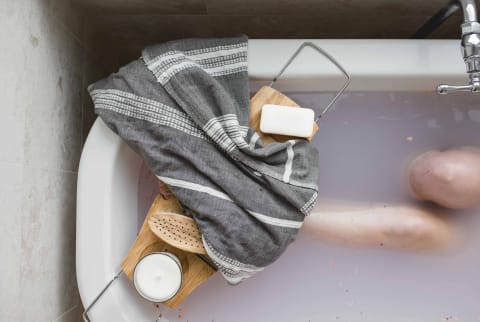Advertisement
No Epsom Salt Bath? Here's How You Get Your Fix Of Soothing Magnesium*


What goes into your dream bath? In addition to fragrant herbs and essential oils like lavender, many dedicated soakers will have a stash of Epsom salts on hand. From viral #bathtoks to celebrity profiles, you can now find a dash of Epsom in every cozy corner of the internet.
Once dissolved in warm water, the magnesium sulfate salts are said to help ease stress, promote calm, and lead to full-body relaxation. Sounds like something everyone could use—even those of us who don't have a bathtub (or do have a bathtub but don't dare use it...fellow NYC renters will relate). Thankfully, there are plenty of other ways to "soak up" the powerhouse mineral's myriad benefits.*
Other ways to get soothing magnesium.
Magnesium is an essential mineral that's responsible for keeping hundreds of processes in the human body running smoothly.* We all have magnesium running through our bodies at all times (assuming we're consuming it, of course), but our levels tend to decline with age. Soaking in a hot tub certainly sounds like an appealing way to get more of the mineral, but there is very limited evidence1 that the magnesium in Epsom salts can actually cross the skin barrier. While they may help support a healthy, hydrated complexion, the benefits of the salts likely stop at the skin.
Instead, the research on how healthy magnesium levels can support muscle relaxation and comfort2 and a steady mood3 has focused on oral application of this mineral.* This means the most surefire way to get the recommended daily intake of magnesium4—420 mg for men and 320 mg for women—is to eat magnesium-rich foods (and oftentimes) take a magnesium supplement.
Let's start with food: Leafy greens, legumes, and a number of nuts and seeds are all healthy sources of this essential macromineral. However, in an age when industrial agriculture is affecting the nutrient density of many foods, around 45%5 of people in the U.S. don't get the recommended daily amount of magnesium through food alone. That's a massive nutrient gap for our nation and where a well-formulated magnesium supplement can come in. Here are mbg's top picks that are pure, gentle, and safe for most people to take daily, though you'll want to consult your doctor before starting with any new supplement.
How to ritualize it.
Now, munching on a forkful of spinach or swallowing a supplement capsule doesn't sound quite as relaxing as soaking in the tub. However, you can reap the benefits of the mineral and bliss out while doing it using mindbodygreen's sleep support+.*
This supplement is designed to be taken as part of a relaxing nightly ritual. It starts with a base of 120 mg of magnesium bisglycinate—a highly absorbable form of magnesium featuring a gentle chelate with amino acid glycine, which has shown promise in promoting high-quality sleep6.* The formula also incorporates jujube, a fruit used in traditional Chinese medicine for its sedative properties, and PharmaGABA®, a calming amino acid neurotransmitter.* Incorporating it into your nightly routine (we recommend taking it one to two hours before bed) can deliver the soothing qualities of a good soak and go one step further to actually help you sleep soundly through the night and wake up feeling refreshed.*
Add in a soothing cup of tea, a great book, and a magnesium-rich bedtime snack, and you have yourself a soothing ceremony that rivals the best bath.
The bottom line.
While bathing in Epsom salts (magnesium sulfate) is a popular way to relax, it doesn't actually deliver much magnesium to the body. Instead, the best way to soak up the benefits of the workhorse mineral is through diet and supplements.*
6 Sources
- https://www.ncbi.nlm.nih.gov/pmc/articles/PMC5579607/
- https://www.ncbi.nlm.nih.gov/labs/pmc/articles/PMC4419474/
- https://www.ncbi.nlm.nih.gov/labs/pmc/articles/PMC4586582/
- https://ods.od.nih.gov/factsheets/Magnesium-HealthProfessional/
- https://www.ncbi.nlm.nih.gov/labs/pmc/articles/PMC6686054/
- https://pubmed.ncbi.nlm.nih.gov/22293292/
